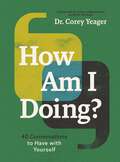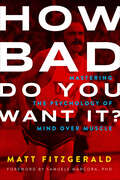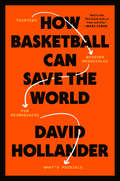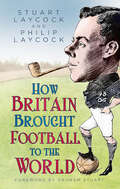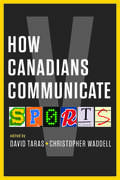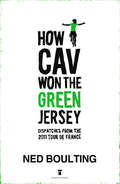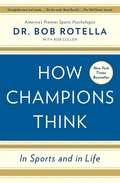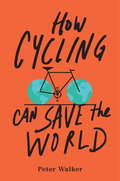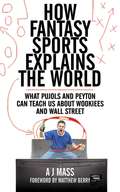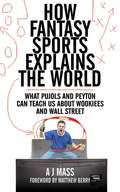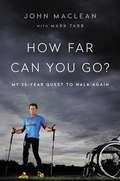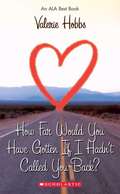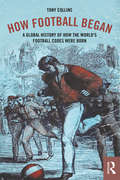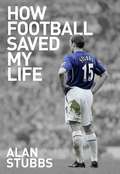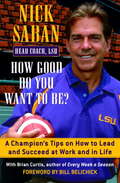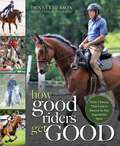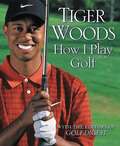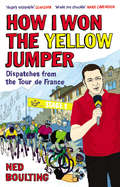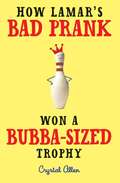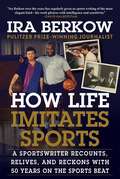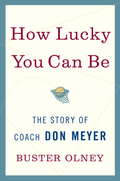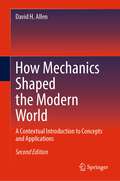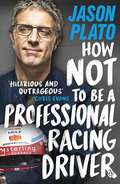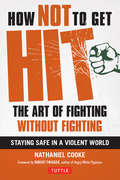- Table View
- List View
How Am I Doing?: 40 Conversations to Have with Yourself
by Dr. Corey YeagerLife is hard. But it gets a whole lot easier when you start to talk it out. In How Am I Doing?, you're invited into a series of conversations with yourself to discover your purpose, honor your story, and explore who you want to be.Dr. Corey Yeager, psychotherapist for the NBA&’s Detroit Pistons and most recently featured on Oprah and Prince Harry's The Me You Can't See on Apple TV+, offers you 40 questions to help you raise awareness of your thoughts and emotions and reconnect with who you want to be.Over the course of these 40 conversations with yourself, you're invited to:Build trust with yourselfConsider how past traumas affect your life todayGrow a practice of positive self-talkLet go of guilt and regret from your pastDevelop mental health strategies for what to for moments when you're depressed or anxiousIncrease your confidence and embrace your emotions Each of the 40 questions is paired with a short, thoughtful reflection from Dr. Yeager, along with prompts and self-care strategies to help you look at yourself in the mirror and come into alignment with who you want to be.So join the conversation; nothing is off-limits here. Come check in with yourself and take these small, simple steps to journey toward a more honest and harmonious way of living.
How Bad Do You Want It?: Mastering the Psychology of Mind over Muscle
by Matt FitzgeraldThe greatest athletic performances spring from the mind, not the body.Elite athletes have known this for decades and now science is learning why it’s true. In his fascinating new book How Bad Do You Want It?, coach Matt Fitzgerald examines more than a dozen pivotal races to discover the surprising ways elite athletes strengthen their mental toughness.Fitzgerald puts you into the pulse-pounding action of more than a dozen epic races from running, cycling, triathlon, XTERRA, and rowing with thrilling race reports and revealing post-race interviews with the elites. Their own words reinforce what the research has found: strong mental fitness lets us approach our true physical limits, giving us an edge over physically stronger competitors. Each chapter explores the how and why of an elite athlete’s transformative moment, revealing powerful new psychobiological principles you can practice to flex your own mental fitness.The new psychobiological model of endurance performance shows that the most important question in endurance sports is: how bad do you want it? Fitzgerald’s fascinating book will forever change how you answer this question and show you how to master the psychology of mind over muscle. These lessons will help you push back your limits and uncover your full potential.How Bad Do You Want It? reveals new psychobiological findings including:Mental toughness determines how close you can get to your physical limit.Bracing yourself for a tough race or workout can boost performance by 15% or more.Champions have learned how to give more of what they have.The only way to improve performance is by altering how you perceive effort.Choking under pressure is a form of self-consciousness.Your attitude in daily life is the same one you bring to sports.There’s no such thing as going as fast as you can—only going faster than before.The fastest racecourse is the one with the loudest spectators.Faith in your training is as important as the training itself.Athletes featured in How Bad Do You Want It?: Sammy Wanjiru, Jenny Simpson, Greg LeMond, Siri Lindley, Willie Stewart, Cadel Evans, Nathan Cohen and Joe Sullivan, Paula Newby-Fraser, Ryan Vail, Thomas Voeckler, Ned Overend, Steve Prefontaine, and last of all John “The Penguin” Bingham
How Basketball Can Save the World: 13 Guiding Principles for Reimagining What's Possible
by David HollanderA thought-provoking exploration of how basketball—and the values rooted in the game—can solve today&’s most pressing issues, from the professor behind the popular New York University courseNBA and WNBA superstars, Hall of Fame players, coaches, and leading cultural figures have all dropped by New York University Professor David Hollander&’s course &“How Basketball Can Save the World&” course to debate and give insights on how the underlying principles of the game can provide a new blueprint for addressing our diverse challenges and showing what&’s possible beyond the court.Now, in How Basketball Can Save the World, Hollander takes us out of the classroom to present a beautiful new philosophy with contributions by many of his past guests and based on values inherent to basketball, such as inclusion and the balancing of individual success with the needs of the collective. These principles move us beyond conflict and confusion toward a more harmonious and meaningful future:Positionless-ness: In basketball, players aren&’t siloed into just one position or responsibility. In life, we can learn to be more adaptive to the challenges we face by embracing a positionless mindset.Human Alchemy: We talk a lot about team chemistry, but team alchemy means the creation of something totally new—a team far greater than the sum of its parts.Sanctuary: Basketball offers players a critical space to feel safe, free, and expressive. Fostering similar spaces in the real world can encourage people to be their best, happiest, and most productive selves.Transcendence: Basketball is about defying gravity, becoming weightless, and flying higher than anyone ever has before. By seeking out this principle, we can elevate ourselves and those around us to a new plane of experience.Whether you&’re a seasoned veteran of the game or have never set foot on a court, How Basketball Can Save the World will empower you to become more resilient, tolerant, and wise in your relationship with yourself, others, and the world around you.
How Britain Brought Football to the World
by Stuart Laycock Philip Laycock'Delighted to learn from this very enjoyable new book that the first ever game of football played in Austria was won by the Vienna Cricket Club.' - Tom Holland, Historian and BroadcasterHave we matched Wembley 1966 and 2022, or lost again on penalties? As a football fan in the Home Nations, there is at least one thing of which you can be sure. Even if sometimes other countries play it better than us, they’ll forever have to thank Britain for the fun, the excitement, the tragedy, the triumph, the pain, the pleasure and the sheer gloriousness of the best sport in the world.From Afghanistan to Zimbabwe, it was Britain that first spread the beautiful game across the world. Cornish miners took football skills along with their pasties to Mexico; Iraqi football legend Ammo Baba learnt the game at an RAF base; the Buenos Aires Cricket Club gave the world Argentine football; and Romanian dentist Iuliu Weiner got not one an English education but a passion for football too.This is a book about football, yes, but it is also a book about all the countries of the world, about shared passion and shared humanity. It’s How Britain Brought Football to the World.
How Canadians Communicate V: Sports
by David Taras Christopher WaddellFewer Canadians than ever are lacing up skates, swimming lengths at the pool, practicing their curve ball, and experiencing the thrill of competition. However, despite a decline in active participation, Canadians spend enormous amounts of time and money on sports, as fans and followers of sporting events and sports culture. Never has media coverage of sports been more exhaustive, and never has it been more driven by commercial interests and the need to fuel consumerism, on which corporate profits depend. But the power plays now occurring in the arena of sports are by no means solely a matter of money. At issue as well in the media capture of sports are the values that inform our daily lives, the physical and emotional health of the population, and the symbols so long central to a sense of Canadian identity. Writing from a variety of perspectives, the contributors to this collection set out to explore the impact of the media on our reception of, and attitudes toward, sports—to unpack the meanings that sports have for us as citizens and consumers. Some contributors probe the function of sports as spectacle—the escalation of violence, controversies over drug use, and the media’s coverage of tragic deaths—while others shed light on the way in which the media serve to transform sports into a vehicle for the expression of identity and nationalism. The goal is not to score points but to prompt critical discussion of why sports matter in Canadian life and culture and how they contribute to the construction of identity.
How Cav Won the Green Jersey: Short Dispatches from the 2011 Tour de France
by Ned BoultingThis is not a 100,000-word, minute-by-minute, blow-by-blow account of the 2011 Tour de France.This is not the story of Cadel Evans.This is not the story of Alberto Contador, Andy Schleck, or Bradley Wiggins.And it's not even the story of Mark Cavendish.(Although he is in it quite a lot.)This is the story of the lesser-known heroes; the Johnny Hoogerlands, the Thomas Voecklers, the hitchhikers, the maniac press drivers, Norbert Dentressangle and the greatest ever Tour de France*.I was there. And this is what I saw. That is all.In this 20,000-word digital short, ITV's Ned Boulting, author of How I Won the Yellow Jumper, takes an honest and idiosyncratic look at the unforgettable 2011 Tour de France, when Mark Cavendish won the Green Jersey.*probably
How Champions Think: In Sports and in Life
by Dr. Bob RotellaAmerica’s preeminent sports psychologist delivers a groundbreaking guide to success in all aspects of life—not just sports—from business to relationships to personal challenges of every variety.Acclaimed sports psychologist Bob Rotella has advised everyone from professional golfers to NBA superstars to business executives on how to flourish under pressure and overcome challenges. Now, for the first time, he’s distilled his decades of in-depth research and practical experience into a potential-unlocking guide for everyone. This exciting book is not a collection of Rotella’s theories; it consists of performance principles that have proven themselves in countless competitive situations, in arenas from which only the strongest minds emerge triumphant. It’s a book full of insights that you can learn and use the next morning—in the office, the classroom, or wherever your quest takes you—told not in abstractions, but through case studies and stories drawn from Rotella’s years teaching sports psychology, counseling athletes, and consulting for Fortune 500 companies. It explores how to keep the mind from holding you back, whatever your physical gifts or other talents. It’s about how to make a commitment, how to persevere, how to deal with failure—and how to train your mind to create a self-image that promotes confidence and accomplishment. Any successful life starts with how you see yourself. And with these pearls of wisdom from the nation’s preeminent sports psychologist, you can learn to achieve the success of your dreams.
How Cycling Can Save the World
by Peter WalkerPeter Walker—reporter at the Guardian and curator of its popular bike blog—shows how the future of humanity depends on the bicycle. Car culture has ensnared much of the world—and it's no wonder. Convenience and comfort (as well as some clever lobbying) have made the car the transportation method of choice for generations. But as the world evolves, the high cost of the automobile is made clearer—with its dramatic effects on pollution, the way it cuts people off from their communities, and the alarming rate at which people are injured and killed in crashes. Walker argues that the simplest way to tackle many of these problems at once is with one of humankind's most perfect inventions—the bicycle. In How Cycling Can Save the World, Walker takes readers on a tour of cities like Copenhagen and Utrecht, where everyday cycling has taken root, demonstrating cycling’s proven effect on reducing smog and obesity, and improving quality of life and mental health. Interviews with public figures—such as Janette Sadik-Khan, who led the charge to create more pedestrian- and cyclist- friendly infrastructure in New York City—provide case studies on how it can be done, and prove that you can make a big change with just a few cycling lanes and a paradigm shift. Meticulously researched and incredibly inspiring, How Cycling Can Save the World delivers on its lofty promise and leads readers to the realization that cycling could not only save the world, but have a lasting and positive impact on their own lives.From the Trade Paperback edition.
How Did Sports Begin: A Look at the Origins of Man at Play
by R. BraschWhat sport was once credited with halting the declining British marriage rate? How did "love" find its way into tennis scoring, or the bull's-eye into archery? How did badminton get its name? What is the only sport invented in America? Sports are as old as time, and the story of where and how they were first played and how they evolved into present-day form is entertaining reading, full of surprises. From cricket and croquet to water skiing and wrestling, forty-five different sports are given their genesis here. Some had mysterious beginnings: the fatherhood of baseball was in dispute for years. Some are older than we would imagine: skis are thought to be more than 5,000 years old, and football dates from 2nd-century China. Others came into existence by accident: a headache led to the discovery of the modern-day Ping-Pong bat! Whatever your interest-and which of us hasn't succumbed to the lure of "the game," either personally or vicariously?-Dr. Brasch's learned eye will turn up fascinating data to satisfy the curiosity of spectators and participants alike. Dr. R. Brasch, chief minister of Temple Emanuel in Sydney, is a student of twelve languages. He is also a broadcaster, telecaster, and contributor to numerous international magazines and journals, and has lectured at universities in America, England, Ireland, South Africa, and Australia. Among his previous books are The Judaic Heritage; Mexico-A Country of Contrasts; and How Did It Begin?, which explores the origins of customs, superstitions, and habits that influence our lives today.
How Fantasy Sports Explains the World
by Matthew Berry Aj MassThe world of fantasy sports is no longer the purview of nerds and stat geeks. In fact, versions of the game are currently played by tens of millions of people worldwide. But while fantasy sports may have begun as a light-hearted diversion, to many of its participants winning or losing is no laughing matter. The book takes readers on a journey from the casinos of Atlantic City to charred Connecticut campgrounds, from the Last Supper to the Constitutional Convention that started our country down the road to democracy, from the back rooms of Wall Street to the jury rooms of our judicial system. In doing so, Mass demonstrates that winning fantasy advice can come from anyone and be found almost anywhere-the wit and wisdom of William Shakespeare, the scientific genius of Stephen Hawking, or the futuristic whimsy of a galaxy far, far away. Ultimately, How Fantasy Sports Explains the World is not a book about how to win your fantasy sports league. Instead, it is a collection of conversation starters and hypothetical scenarios that get right to the core of what makes fantasy games so compelling in the high-speed information age: how to process and make use of the bottomless pile of data presented to us on a daily basis.
How Fantasy Sports Explains the World: What Pujols and Peyton Can Teach Us About Wookiees and Wall Street
by Matthew Berry Aj MassThe world of fantasy sports is no longer the purview of nerds and stat geeks. In fact, versions of the game are currently played by tens of millions of people worldwide. But while fantasy sports may have begun as a light-hearted diversion, to many of its participants winning or losing is no laughing matter. And as a professional fantasy sports expert who doles out advice on a daily basis for ESPN.com, author AJ Mass has learned one basic and inescapable truth about his job: people take what he says very seriously. When asked whether Player X or Player Y would be better to place in their fantasy lineup on a given day, what makes his recommendation of Player X carry so much weight is, more than anything else, he is simply not afraid to voice that opinion.How Fantasy Sports Explains the World is an entertaining, anecdotal exploration of how the skills used in evaluating fantasy sports talent are one and the same with those skills we all use every day of our lives, in all manner of everyday situations. It takes the reader on a journey from the casinos of Atlantic City to charred Connecticut campgrounds, from the Last Supper to the Constitutional Convention that started our country down the road to democracy, from the back rooms of Wall Street to the jury rooms of our judicial system. In doing so, the author demonstrates that winning fantasy advice can come from anyone and be found almost anywhere - the wit and wisdom of William Shakespeare, the scientific genius of Stephen Hawking, or the futuristic whimsy of a galaxy far, far, away.
How Far Can You Go?: My 25-Year Quest to Walk Again
by Mark Tabb John MacleanAn inspirational memoir by a man who became an elite wheelchair athlete after suffering a catastrophic spinal injury and who finally walked again 25 years after his accident. After two years of intense physical therapy following his crippling accident, John Maclean set a new course for himself when his father encouraged him to embrace his new reality and asked: "How far can you go?" Inspired, Maclean became the first paraplegic to complete the Ironman World Championship and swim the English Channel before going on to win a silver medal for rowing at the 2008 Paralympic Games--yet these achievements did not come easy or on his first try. But with fierce tenacity, determination, and the love of family and friends Maclean was able to see each dream realized. Yet he longed for one more victory: to walk on the beach with his family, holding his wife's hand. Through a radical therapy, he retrained his mind and challenged conventional thinking to walk again after 25 years in a wheelchair. HOW FAR CAN YOU GO? is his amazing story.
How Far Would You Have Gotten If I Hadn't Called You Back?
by Valerie HobbsWhen 16-yr-old Bronwyn Lewis's family uproots itself and moves across the country to sleepy Ojala, California, Bron is caught off-guard by the effortless cool of her new classmates. In order to make it in Ojala, Bron will have to remake herself. And so she does, putting aside her studies to drag race, hang out, and meet boys. Soon she's involved in an intense love triangle -- with no easy solutions.
How Football Began: A Global History of How the World's Football Codes Were Born
by Tony CollinsThis ambitious and fascinating history considers why, in the space of sixty years between 1850 and 1910, football grew from a marginal and unorganised activity to become the dominant winter entertainment for millions of people around the world. The book explores how the world’s football codes - soccer, rugby league, rugby union, American, Australian, Canadian and Gaelic - developed as part of the commercialised leisure industry in the nineteenth century. Football, however and wherever it was played, was a product of the second industrial revolution, the rise of the mass media, and the spirit of the age of the masses. Important reading for students of sports studies, history, sociology, development and management, this book is also a valuable resource for scholars and academics involved in the study of football in all its forms, as well as an engrossing read for anyone interested in the early history of football.
How Football Saved My Life
by Alan StubbsThe day had gone badly: Celtic had just lost to their Old Firm rivals Rangers in the 1999 Scottish Cup final, and now Alan Stubbs had to provide a sample for a random drugs test. Little did he know, but it would help save his life... The results of the test showed he had testicular cancer, and suddenly, at the age of 27 and at the peak of fitness, he realised that he had the biggest battle of his life in front of him. In this compelling and moving memoir, Stubbs recalls his despair at the time and explains how, with the support of family, friends and fans as well as terrific doctors, he pulled through to resume his career at the top. And what a career it was. First he helped Bolton Wanderers climb up two divisions to reach the Premier League in 1995. The following season, he moved to Celtic for a record fee, helping them to break the stranglehold on the league title held by Rangers. After recovering from cancer, he moved to Everton, his hometown club, where he would spend most of the rest of his playing career, lining up alongside (among others) an ageing Paul Gascoigne and an emerging Wayne Rooney. A knee injury forced him to retire in 2008, but he is now on the coaching staff at Everton. A player who has seen the game at all levels, he has also had to contend with the most shocking challenges in life, which makes his story an unmissable read.
How Good Do You Want to Be? A Champion's Tips on How to Lead and Succeed at Work and in Life: A Champion's Tips on How to Lead and Succeed at Work and in Life
by Brian Curtis Nick SabanHe guided LSU to its first football championship in forty-five years. He turned down countless offers from professional teams to stay with the job he loves. Now Nick Saban reveals the secrets that will help you lead and succeed at work and in life. Excellence doesn't happen overnight. It comes from hard work, consistency, the drive to be the best, and a passion for what you do. Few understand this better than Nick Saban, the hottest college football coach in the game. Now, in How Good Do You Want to Be?, Saban shares his winning philosophy for creating and inspiring success. In more than three decades as a player and coach, Saban has learned much about life and leadership, both on the field and off. Working alongside some of the game's legends, including Super Bowl winner Bill Belichick and coaching legend Jerry Glanville, he saw firsthand how great leaders encourage greatness in others. In this candid, insightful guide, he shares such acquired wisdom as *Organization, Organization, Organization. Create an environment where everybody knows his or her responsibilities--and each is responsible to the entire group. *Motivate to Dominate. Understand the psychology of teams and individuals, and use that knowledge to breed success. *No Other Way than Right. Practice ethics and values--and demand the same from your team. *Look in the Mirror. Maintain an understanding of who you are by knowing your strengths and your weaknesses. How Good Do You Want to Be? is more than the story of how Nick Saban motivates his staff and players to excel--it is also the memoir of one of America's most successful coaches. Filled with instructive anecdotes and illuminated by never-before-told stories of his life and career, this is a book that challenges and inspires us all to be our best.
How Good Riders Get Good: New Edition
by Denny EmersonNow in a revised edition that includes new top good-rider profiles, this book is exactly what you need to become a better rider. It's a smart, honest, on-target kick-in-the-pants, guaranteed to rev your engines as you see how a few changes in your life, a few smart choices and strategic moves, can transform you from a run-of-the-mill rider into a GOOD one. How does Denny Emerson know what makes a good rider? For one thing, he IS one—he is the only rider in the world to have won both a gold medal in international eventing and a Tevis Cup buckle in endurance. Plus, he's been around great riders, and taught those on their way to becoming great, for over 40 years. How will what Denny knows help YOU become a good rider? It's simple, really. He's boiled the whole thing down into seven broad Areas of Choice that collectively determine whether you are a gonna be or you're going to get it done or whether you'll be stuck in the wannabe category for decades.You'll examine how your choice of riding sport may or may not be the best for who you are and where you live, and how those frustrating hurdles known as life circumstances don't necessarily hold you back like you think they do. Plus, find out how to build a strong support team by winning people to your cause and choosing the right teachers and mentors. Analyze your physical self (your body, how it is formed and how you care for it) and your intellectual self (your horse smarts and how you are adding to them or not) and apply the results to your gonna-be-good equation. Learn to take a good hard look at your partner—your horse—and think critically about his ability to help you attain your riding goals.In addition, discover the nine key character traits of successful riders and how you can learn to call each one of them your own. Along the way you'll read the stories of 23 of the world's top riders from different disciplines and sports—including dressage, reining, driving, show jumping, endurance, hunter/jumper, and eventing—and how they got good despite the same kinds of challenges and setbacks you face in your own day-to-day riding. You'll get an inside look at their path to success, as well as their very best tips for how to make it in the horse industry.
How I Play Golf
by Tiger WoodsSince turning pro after a short stint at Stanford University, no one athlete has dominated their sport as Tiger Woods has dominated the world of golf. His list of achievements and championships would fill pages.But how does he do it? In HOW I PLAY GOLF, through fabulous color photos, slow-motion photography, and plenty of text, Tiger talks about his drives, his putting, his chip shots, his mental approach to the game, and much more more. This is the complete instructional on how Tiger plays the game of golf.Tiger shares his thoughts on what he calls the game for a lifetime. He reveals the five secrets he believes are responsible for his success -- a combination of physical, metaphysical, and psychological practices he uses daily to keep his game in top shape and to help him to transcend all the ups and downs of golf. Not many can play golf as well as Tiger does, but at least we can read how we can try to improve our game. This one singular volume contains all the golf instruction that anyone would ever need.
How I Won the Yellow Jumper: Dispatches from the Tour de France
by Ned Boulting'Paris, 4 July 2003: My first Tour de France. I had never seen a bike race. I had only vaguely heard of Lance Armstrong. I had no idea what I was doing there. Yet, that day I was broadcasting live on television. I fumbled my way through a few platitudes, before summing up with the words, "...Dave Millar just missing out on the Yellow Jumper." Yes, the Yellow Jumper.'Follow Ned Boulting's (occasionally excruciating) experiences covering the world's most famous cycling race. His story offers an insider's view of what really goes on behind the scenes of the Tour. From up-close-and-personal encounters with Lance Armstrong to bewildered mishaps with the local cuisine, Ned's been there, done that and got the crumpled-looking t-shirt. Eight Tours on from Ned's humbling debut, he has grown to respect, mock, adore and crave the race in equal measure. What's more, he has even started to understand it. Includes How Cav Won the Green Jersey: Short Dispatches from the 2011 Tour de France
How Lamar's Bad Prank Won a Bubba-Sized Trophy
by Crystal AllenThirteen-year-old Lamar Washington is the maddest, baddest, most spectacular bowler at Striker's Bowling Paradise. But while Lamar's a whiz at rolling strikes, he always strikes out with girls. And his brother, Xavier the Basketball Savior, is no help. Xavier earns trophy after trophy on the basketball court and soaks up Dad's attention, leaving no room for Lamar's problems. Until bad boy Billy Jenks convinces Lamar that hustling at the alley will help him win his dream girl, plus earn him enough money to buy an expensive pro ball and impress celebrity bowler Bubba Sanders. But when Billy's scheme goes awry, Lamar ends up ruining his brother's shot at college and every relationship in his life. Can Lamar figure out how to mend his broken ties, no matter what the cost? From debut author Crystal Allen comes an unforgettable story of one boy's struggle to win his family's respect and get the girl of his dreams while playing the sport he loves.
How Life Imitates Sports: A Sportswriter Recounts, Relives, and Reckons with 50 Years on the Sports Beat
by Ira BerkowMemorable Stories From a Half Century of Sports Journalism For the last half century, Pulitzer Prize–winning sportswriter Ira Berkow has been at the center of some of the most memorable moments in sports history. From the World Series, NBA Finals, and Super Bowl, to Heavyweight Title Fights, the Olympics, and The Masters, he has seen and covered them all. After fifty years covering sports, with more than twenty-five as a journalist for the New York Times, How Life Imitates Sports shares how these events—and their participants—have significantly shaped how we as a nation have come to understand and perceive our culture (and even our politics). They are a historical record of one significant sphere of our life and times: sports. From Muhammad Ali to Mike Tyson, Michael Jordan to LeBron James, Jackie Robinson to Derek Jeter, Billie Jean King to Tonya Harding, O. J. Simpson to Tiger Woods and beyond, this collection is a historical record of our times over this past half century, in terms of society, race and gender, politics, legal issues, and the fabric of our sports passions and human condition, ranging from pathos to humor, from introspection to perception. Including additional commentary on when these events first occurred and how they have impacted us today, Berkow shares the knowledge of someone who sat ringside, in the press box, and on the sidelines for some of the most notable moments in our history. So whether you&’re a fan of baseball and basketball, or tennis and soccer, How Life Imitates Sports shows you our history from someone who witnessed it first-hand; a worthy collection for anyone who appreciates the highest quality sports journalism.
How Lucky You Can Be: The Story of Coach Don Meyer
by Buster OlneyIn September 2008, Northern State University men#x19;s basketball coach Don Meyer stood on the brink of immortality. He was about to surpass the legendary Bobby Knight to become the all-time NCAA wins leader in men#x19;s basketball. Then, on a two-lane road in South Dakota, everything changed in an instant. InHow Lucky You Can Be, acclaimed sports journalist Buster Olney tells the remarkable story of the successive tragedies that befell Coach Meyer but could not defeat him. Laid low by a horrific car accident that led to the amputation of his left leg below the knee, Coach Meyer had barely emerged from surgery when his doctors informed him that he also had terminal cancer. In the blink of an eye, this prototypical 24/7 workaholic coach-who arrived at the gym most mornings before 6 a. m. -found himself forced to reexamine his priorities at the age of sixty-three. A model of reserve, Coach Meyer had sacrificed much of his emotional life to his program. His wife, Carmen, felt disconnected because of his habitual reticence, while his three children-all now well into adulthood-had long had to compete with basketball for his attention. With sensitivity and skill, Olney shows how Coach Meyer mined his physical ordeal for the spiritual strength to transform his life. In the months that followed his accident and diagnosis, he reached out to family, friends, and former players in a way he had never been able to do before, making the most of this one last opportunity to tell those close to him how he felt about them-and in turn he received an outpouring of affirmation that confirmed how deeply he had affected others. Sustained throughout an often painful recovery by his love of basketball, he would return to the court once more-with a newfound appreciation for the game#x19;s place in his life. The inspirational story of a life renewed by unimaginable hardship,How Lucky You Can Beproves that it#x19;s never too late to start making changes-and reminds us that fortune can smile upon us even in our most trying hours. From the Hardcover edition.
How Mechanics Shaped the Modern World: A Contextual Introduction to Concepts and Applications
by David H. AllenThis updated and augmented second edition covers the history of mechanics in such a way as to explain how this all-important discipline shaped our world. Like the first edition, Dr. Allen presents the material in an engaging, accessible manner, with many historic insights and thorough explanations of attending concepts. The text retains its coverage of classical mechanics, essentially Newtonian mechanics, and adds chapters on three additional topics that go well beyond classical mechanics: relativity, quantum/nanomechanics, and biomechanics.
How Not to Be a Professional Racing Driver
by Jason Plato'HILARIOUS AND OUTRAGEOUS' CHRIS EVANS THE HILARIOUS FULL-THROTTLE MEMOIR FROM ONE OF THE BIGGEST CHARACTERS IN UK MOTOR RACINGSHORTLISTED FOR THE TELEGRAPH SPORTS BOOK AWARDS 2020 Two-time championship-winning and record-breaking racing driver, Jason Plato is a living, breathing example of what you shouldn't do if you want to become a professional racing driver: DO NOT: · Steal a JCB in Monaco and end up in prison there - twice · Kill Bernie Ecclestone (almost) · Choose fags and booze over the gym · Give Prince Charles the finger on the M42 · Make enemies with a 6ft 6" rival who is a black belt in everything Since joining the Williams Touring Car team in 1997 he has had more race wins than Lewis Hamilton and Stirling Moss, competed in more races than Jenson Button and set the largest number of fastest laps ever. But he's also a rule breaker who has had more than his fair share of near-death experiences, drunken escapades and more. There is nothing sensible, predictable or considered about Jason.But this is how he became a racing legend. ______ LONGLISTED FOR THE TELEGRAPH SPORTS BOOK OF THE YEAR AUTOBIOGRAPHY AWARD 'As entertaining as watching him drive, a cracking read!' Sir Chris Hoy 'Jason Plato is one of the most gifted racing drivers of his generation!' Damon Hill
How Not to Get Hit
by Robert Twigger Nathaniel CookeThe average person isn't looking to be in a situation where fists are going to fly, but many of us have found ourselves there anyway. At that moment, it's probably too late to do anything about it. But how do we change circumstances so those situations don't happen? How Not to Get Hit is a book on personal safety for people who don't want to learn to fight, but do want to learn how to avoid those situations where a fight is likely to develop.Told in a lighthearted, irreverent style, How Not to Get Hit takes you on a journey through the funny side of violence, its roots in our evolutionary past and where it fits in to modern society. Self defense isn't a series of techniques or moves, it's an attitude, a strategy and a life skill. This book will give you an understanding of why people want to use violence, how they will use it and using this knowledge to manage situations and create a better outcome.
